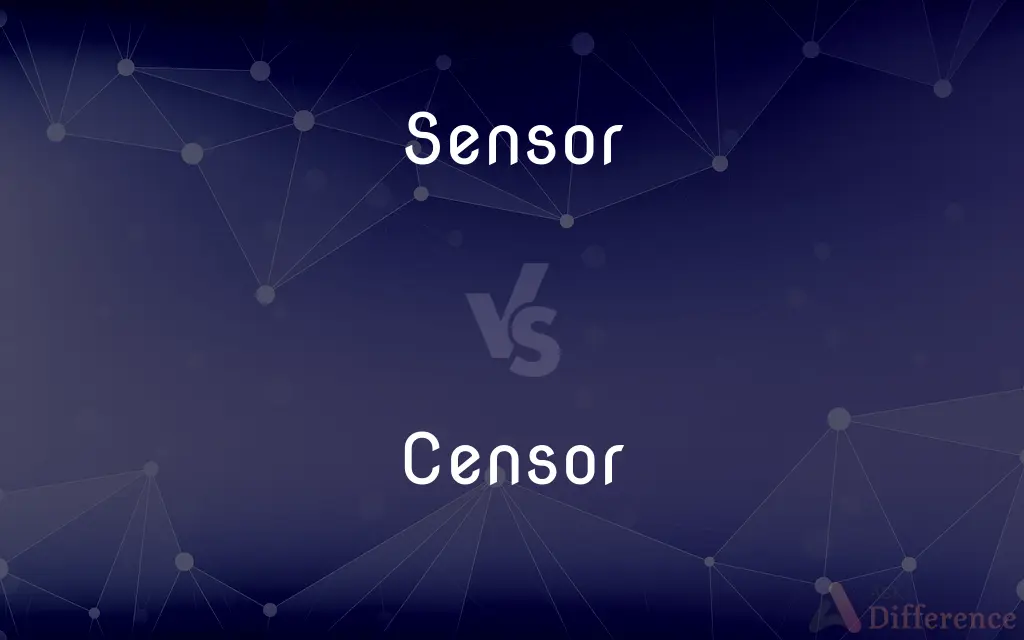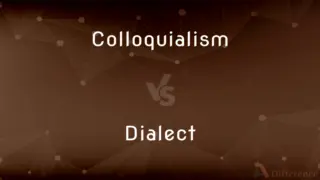Sensor vs. Censor — What's the Difference?
By Maham Liaqat & Fiza Rafique — Updated on March 20, 2024
Sensor detects or measures physical properties, while Censor restricts content deemed inappropriate or harmful.

Difference Between Sensor and Censor
Table of Contents
ADVERTISEMENT
Key Differences
A sensor is a device or mechanism that detects changes in physical conditions or measures physical quantities like temperature, light, pressure, or motion, converting them into signals that can be read by an observer or instrument. For example, a thermometer is a type of sensor that measures temperature. On the other hand, a censor is a person or body that examines books, movies, letters, and other forms of communication to suppress any content considered obscene, politically unacceptable, or a threat to security.
Sensors play crucial roles in various fields, including technology, science, and everyday applications, enabling automation, safety, and efficiency. Censorship can occur in various contexts, from media and entertainment to political communication, with the intent of protecting society, maintaining public morals, or ensuring national security. However, it also raises debates about freedom of speech and the balance between protection and control.
While a sensor operates in the realm of physical science, providing data and insights based on physical phenomena, a censor operates in the realm of social, political, and ethical considerations, making judgments about what content is suitable for dissemination or public consumption.
The use of sensors is often driven by the need for accuracy, safety, and operational efficiency, such as in environmental monitoring, manufacturing processes, or healthcare devices. Conversely, the act of censoring is driven by moral, cultural, legal, or political criteria, aiming to filter out content that is considered harmful, offensive, or undesirable.
Understanding the distinction between sensor and censor is essential not only for clarity in communication but also for appreciating the different roles they play in society. Sensors enhance our ability to interact with and understand our physical environment, while censors navigate the complex landscape of human values, communication, and ethics.
ADVERTISEMENT
Comparison Chart
Definition
A device that detects or measures physical properties.
A person or body that restricts content deemed inappropriate.
Function
Converts physical quantities into signals.
Examines and suppresses content.
Context
Technology, science, environmental monitoring.
Media, entertainment, political communication.
Purpose
To provide data, ensure safety, enable automation.
To protect society, maintain public morals, ensure security.
Principle
Operates based on physical phenomena.
Operates based on moral, cultural, legal criteria.
Compare with Definitions
Sensor
Device for detection/measurement.
A light sensor automates street lights based on daylight.
Censor
Influences media and public communication.
Censorship can determine the type of news that reaches the public.
Sensor
Enhances safety and operational performance.
Smoke sensors in buildings detect fire hazards early.
Censor
Operates within legal and ethical frameworks.
Censors work to balance freedom of expression with public safety.
Sensor
Converts physical phenomena to signals.
Pressure sensors in a car's tires alert when pressure is low.
Censor
Engages in suppression of speech, ideas.
A censor may remove sensitive political content from publications.
Sensor
Used in various applications for efficiency.
Temperature sensors in thermostats regulate heating and cooling.
Censor
Authority that restricts content.
The film board censors movies for content deemed inappropriate for minors.
Sensor
Integral to modern technology and automation.
Motion sensors activate security systems upon detection of movement.
Censor
Can be controversial, sparking debates on rights.
Internet censorship raises questions about privacy and freedom.
Sensor
In the broadest definition, a sensor is a device, module, machine, or subsystem whose purpose is to detect events or changes in its environment and send the information to other electronics, frequently a computer processor. A sensor is always used with other electronics.
Censor
A person authorized to examine books, films, or other material and to remove or suppress what is considered morally, politically, or otherwise objectionable.
Sensor
A device, such as a photoelectric cell, that receives and responds to a signal or stimulus.
Censor
An official, as in the armed forces, who examines personal mail and official dispatches to remove information considered secret or a risk to security.
Sensor
See sense organ.
Censor
One that condemns or censures.
Sensor
A device or organ that detects certain external stimuli and responds in a distinctive manner.
Censor
One of two officials in ancient Rome responsible for taking the public census and supervising public behavior and morals.
Sensor
Sensory; as, the sensor nerves.
Censor
(Psychology) The component of the unconscious that is posited by psychoanalytic theory to be responsible for preventing certain thoughts or feelings from reaching the conscious mind.
Sensor
Any device that receives a signal or stimulus (as heat or pressure or light or motion etc.) and responds to it in a distinctive manner
Censor
To examine and expurgate.
Censor
One of the two magistrates who originally administered the census of citizens, and by Classical times (between the 8th century {{B.C.E.}} and the 6th century {{C.E.}}) was a high judge of public behaviour and morality.
The Ancient Roman censors were part of the cursus honorum, a series of public offices held during a political career, like consuls and praetors.
Censor
A high-ranking official who was responsible for the supervision of subordinate government officials.
Censor
An official responsible for the removal or suppression of objectionable material (for example, if obscene or likely to incite violence) or sensitive content in books, films, correspondence, and other media.
The headmaster was an even stricter censor of his boarding pupils’ correspondence than the enemy censors had been of his own when the country was occupied.
Censor
(education) A college or university official whose duties vary depending on the institution.
Censor
(obsolete) One who censures or condemns.
Censor
(psychology) A hypothetical subconscious agency which filters unacceptable thought before it reaches the conscious mind.
Censor
(transitive) To review for, and if necessary to remove or suppress, content from books, films, correspondence, and other media which is regarded as objectionable (for example, obscene, likely to incite violence, or sensitive).
The people responsible for censoring films have seen some startling things in their time.
Occupying powers typically censor anything reeking of resistance
Censor
One of two magistrates of Rome who took a register of the number and property of citizens, and who also exercised the office of inspector of morals and conduct.
Censor
One who is empowered to examine manuscripts before they are committed to the press, and to forbid their publication if they contain anything obnoxious; - an official in some European countries.
Censor
One given to fault-finding; a censurer.
Nor can the most circumspect attention, or steady rectitude, escape blame from censors who have no inclination to approve.
Censor
A critic; a reviewer.
Received with caution by the censors of the press.
Censor
A person who is authorized to read publications or correspondence or to watch theatrical performances and suppress in whole or in part anything considered obscene or politically unacceptable
Censor
Forbid the public distribution of ( a movie or a newspaper)
Censor
Subject to political, religious, or moral censorship;
This magazine is censored by the government
Common Curiosities
Is censorship always a negative force?
The perception of censorship depends on context; it can protect individuals from harm but also suppress freedom.
Are there sensors that can detect online content?
There are digital tools and algorithms that can monitor and analyze online content, but these are not sensors in the traditional physical sense.
How has the role of censors changed with the internet?
The internet has complicated censorship, with censors facing challenges in controlling the vast amount of online content.
Can sensors be used to enforce censorship?
Technically, sensors can be part of systems that monitor and control information flow, but directly, they are not tools of censorship.
Can a sensor violate privacy?
While sensors collect data, concerns arise when they collect personal information without consent, potentially impacting privacy.
How do different countries approach censorship?
Approaches vary widely, with some countries enforcing strict censorship for political, cultural, or moral reasons, while others have more liberal policies.
What is the future of sensors and censorship?
As technology advances, sensors will become more integrated into our lives, and the debate over censorship will likely intensify, reflecting ongoing tensions between security, privacy, and freedom.
How do cultural values influence censorship?
Cultural values play a significant role in defining what is considered appropriate or offensive, thereby influencing censorship standards. What may be acceptable in one culture could be subject to censorship in another, reflecting differing moral and ethical standards.
How do sensors contribute to the advancement of smart cities?
Sensors are foundational to smart cities, enabling the collection of data on traffic patterns, environmental conditions, resource usage, and more. This data drives efficiencies in energy use, transportation, public safety, and urban planning, making cities more responsive to the needs of their inhabitants.
Can technology override censorship?
Technology can both aid and combat censorship, with tools available to bypass restrictions, but also new means to enforce them.
Can the use of sensors lead to inadvertent censorship?
Indirectly, yes. For example, automated content moderation systems, which rely on sensors and algorithms to detect harmful content, might overzealously block or restrict legitimate expression, leading to a form of inadvertent censorship.
What ethical considerations are involved in sensor technology deployment?
The deployment of sensor technology raises ethical questions regarding surveillance, data privacy, and the potential for misuse of information. Ensuring that sensors collect data responsibly and transparently, with clear benefits to society and minimal risks to individual privacy, is a key ethical challenge.
Are there international laws regarding censorship?
While there are international human rights standards that address freedom of expression, specific laws and regulations regarding censorship vary by country. International bodies like the United Nations advocate for the balance between freedom of expression and the protection of individuals from harm, but enforcement is largely at the national or local level.
Share Your Discovery

Previous Comparison
City vs. Region
Next Comparison
Colloquialism vs. DialectAuthor Spotlight
Written by
Maham LiaqatCo-written by
Fiza RafiqueFiza Rafique is a skilled content writer at AskDifference.com, where she meticulously refines and enhances written pieces. Drawing from her vast editorial expertise, Fiza ensures clarity, accuracy, and precision in every article. Passionate about language, she continually seeks to elevate the quality of content for readers worldwide.














































